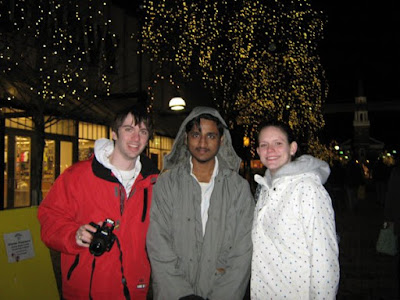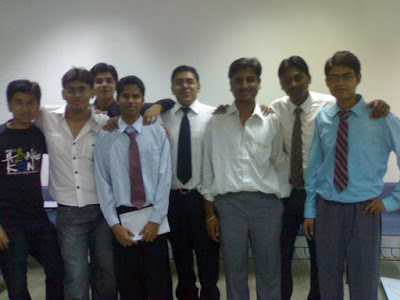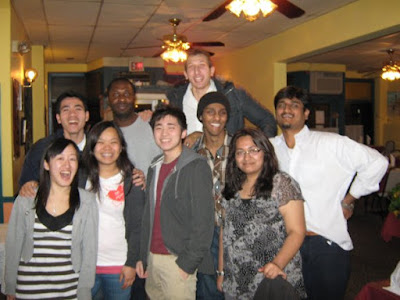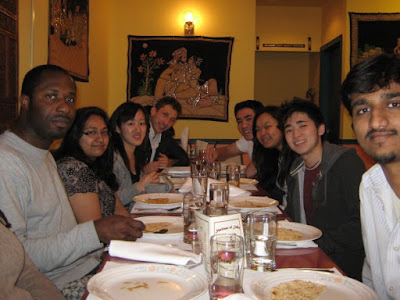Probably I am in narcissistic mood now.. I just fished out all the photos I am in and getting them here..
2. If you need more data to prove your point, you'll never have enough data to prove your point.
3. Analysis paralysis.
4. "Time flies like an arrow. Fruit flies like a banana." (Groucho)
5. You already know what to do.
6. You're going to follow your gut, anyway.
7. "Not everything that counts can be counted; and not everything that can be counted counts." (Einstein)
8. By the time you put your business case together, the market has passed you by.
9. "Conclusions arrived at through reasoning have very little or no influence in altering the course of our lives." (Carlos Casteneda)
10. The scientific method came to Rene Descartes in a dream!

Tommy was bashing Alex with snow all the way down.. Alex ate some of the snow..
This is my room that Champlain alloted to me.. It is 215, South Prospect St, Room # 201. The only thing that I dont like is that it is painted pista-green and it had only one yellow bulb in it.. We changed it though..
I went to Lake Champlain with Roman.. It is about 25 minutes walk from my dorm.. But since the road is all the way downhill, you dont feel much tired..
All trademarks and copyrights are the property of their respective owners. Some are from KuoDesign.
Here are photos around 33 MB that I have accumulated over 2 years from various sources. I might have downloaded copyrighted images too, but this is Steve's fandom.. and that rule is distorted in my reality.
I will be posting the papers I write for Champlain courses. I am required to maintain the "academic standards" and thus my language in these kind of posts might be dry and boring. But I have really done research for these. So take them seriously.
“Plato has segregated the citizens of the Republic into 3 rigid groups. Do you think this hierarchical society can be successful if it came into existence? Evaluate the drawbacks and the benefits of such a government. Which type of government do you think would ensure contentment and happiness to all strata of society -- Democracy? Monarchy? Communism? State your views explicitly.”
Plato divided his kallipolis into three classes – namely the producers, the guardians and the rulers. Plato was adamant not to provide any social mobility in his kallipolis. When interrupted by Adeimantus that the most powerful people in his city were to lead an almost ascetic lifestyle, and the manual laborers were allowed more freedom to carve out their own social habits, Plato hit out by saying that his aim was to make the whole city happy, not just one section of the population. If just one section were bestowed too much freedom and wealth, it would create discontent among the rest, and spite among the rich.
Plato was of the opinion that if we make something so beautiful that it doesn’t seem what it was supposed to seem, then it is a lost effort. If the farmers and craftsmen lolled around in heaps of gold, Plato said, and ignored their craft, then that wouldn’t harm the city much. However, if the guardians themselves regaled and celebrated, then the city would be open to attack – from the neighboring cities from the outside, and the brewing discontent from the inside. They wouldn’t remain ‘just’ rulers. Plato said that the teachers of the guardians will persuade them and condition them in such a way that the guardians would willingly set aside material wealth and embrace their duty with their body and soul.
Such a situation is portrayed beautifully in Peter Jackson’s movie – ‘The Lord of the Rings’ – the movie about the mythological Middle Earth. While the citizens rejoice after defeating the enemy in a major battle, the rulers still continue to anticipate the Dark Lord’s last attempt to vanquish the Humans. A similar scene was shown in ‘Titanic’; the passengers aboard continue their drinks and dance – while the ships officers fight for time for the sinking ship.
Plato further says that the profession of a son must the same as that of his father. The bloodline of the guardians must be preserved. Only the descendants of a king shall be the rulers, only the descendants of the courtiers shall enjoy the nobility and the sons of farmers would continue toiling in the sun. This would enrage any twenty-first century libertarian human rights activist. Such restricted social mobility is often frowned upon in our times. We all want to go to America, where anyone can become rich – where anyone and everyone can build up a fortune based upon his own talent, ability and resourcefulness. For those who do not think internationally (or are patriotic), Mumbai is their City of Dreams. A place where a suburban boy could become big in Bollywood, where an illiterate young man could build a business empire. This is dream is shown perfectly in the movie Bunty Aur Babli, where the highly ambitious Bunty wants to leave his sleepy town of Fursatganj and come to Bambai, because this is the city which rewarded the Tatas, the Birlas and the Ambanis. Plato would certainly not have approved of Mumbai, New York and London.
Ok, now let us consider the above three cities. Mumbai is the nerve centre of the world’s largest democracy. New York is supposed to be the world’s financial capital, while London is the last remaining civilized place in the world. Mumbai is housed in a democracy; NY is under the federal government while London used to be under a monarchy. The reason these cities are the nerve centers is that these cities absorbed everybody. These cities are pursued by the ambitious because these are the places where one can smell, taste and touch success. To live (or exist) in such shimmering places is regarded by many as their only goal in life. Why? Because it allows mobility. Never will a young person will dream of making a career in Beijing or Sao Paolo or South Africa or the Middle East. Unless that career is in drugs or guns. The public in these places is never allowed to live free. To make a fortune in such cities will require extremely powerful connections in the right places. No one from a middle class background would want to go there. The cities which boast of a track record of rising billionaires will attract more aspiring billionaires. The cities which are doused in blood and gun powder will attract the scavengers.
This sets the record of classifying the citizens straight. If a city may follow Plato’s blueprint of the kallipolis may find itself embroiled in constant revolts. The peasants, after having tasted wealth, would want more, and rob the merchants. The merchants, having gained money, would now want power. The guardians, if all too powerful, may impose tyrannical rule over the city. While it is possible to condition and program the minds of the guardians to stay away from all vices, the chain of the bloodline rulers will always have a weak link. Once the barter system was done away with, and currency was recognized as value, everyone would want to have a piece larger than one gets.
The British monarchy understood this long before. Having faced a couple of revolts, the rulers came to realize that sharing the power with the citizens will quell the uprisings. This gave rise to the representational form of government, which is now being used almost globally. The citizens were satisfied. The rulers were allowed the right to the Title. And the armed forces were controlled by the representatives of the masses. The monarchy was transformed into a democracy. Everything seemed to be rosy. Or so it seemed.
The scenes behind the curtains hid the maneuvers of the rulers. Even though they no longer pass laws, they have an inordinate amount of influence over the ones who do. Those who once beseeched the kings now are lobbyists, playing for their clients, and getting the laws and judgments passed in their favor. In India too, those who once owned the lands as kings in olden times now own the same lands through corporations. Democracy is just a façade put up on autocracy. And it is a beautiful façade too.
The voting public believes it has voted for the best man for the job. Yet they fail to realize that they have voted for the one who has marketed himself well to the public. They fail to realize that the best man might not even have contested for the elections and follow the herd, where the herder is a ruler in disguise. Those who do contest are photogenic people with ‘charmth and warmth’ and have good rhetoric skills. These are not required of a ruler…they are required for an actor. Yet, these politicians all over the world do put up a good drama, as they dance to the tunes of the same bloodlines, which once used to seat in the royal throne, but is now in the CEO’s chair, behind a corporation.
There are many reasons why democracy is loved all over the world. The most important selling points of democracy is the promise of better life, and illusion of a share in the administration. These may not be achieved by a person outright. If the person fails to find what he wants, then democracy sells Hope too. Never to lose hope is what our wise old men have taught us. Having been unable to uncover the sham of the government themselves, they forward it to us in the category of ‘values and culture and tradition’. Secondly, since everyone is entitled to have a say in the administration, confusion and chaos soon engulfs the parliament halls, and the powerful among us strike at the right moment to have their way. Free mass media, one of the crown jewels of democracy, is measure of the public memory. The mass media decides what the public should listen to, what should be the headlines, and what should be mentioned in the sidelines. The mass media is one of the most powerful weapons in the autocratic rulers’ arsenal. Only that they wield it subtly.
Democracy is a necessity based on an idea of a ‘social contract’. People want to be free, but too much freedom can be dangerous. Hence, we surrender a few of our liberties in exchange for curtailing others’ freedom and for our own protection. Government, and by consequence, democracy is a form of social restriction. It makes no sense to say “I love democracy” and “I love freedom” in the same breath.
Communism, as described by Karl Marx, seems an ideal concept. Communism, as put into practice in the USSR and China, is a form of government totalitarianism that has led to brutalizing the populace. While Nazis and communists are at the opposite ends of the political spectrum, they use the same means to achieve their goals. India is a nation born from revolution against authority. It was founded on the ideal that ultimate power rests in the hands of its citizens. Communism dismisses this individual empowerment as ‘greed’, and assigns power to the State, commonly called the ‘collective’.
While democracy and brings in capitalism into a country, communism wants to abolish that capitalism and the competition that comes with it. So now democracy wants to remove communism from its country, but it can’t. Because a bunch of intellectuals and puppeteers just go on squabbling. Up comes a ruler, known as Hitler, and creates fascism (which promotes the genetic advantage in its propaganda), which hates communism. So capitalism and fascism together hate communism and they have war. Then fascists kill many people – and the world is afraid. So here comes democracy to the rescue again.
After having gone through all these ‘-isms’, I think that a conclusion can be reached - All form of government was designed to ‘control’ the disasters that crazy people could do. No government was ever designed to keep people happy.
Now we come to the final question – which is the better one? The indecisive among us might want a cocktail of all the three. They might try to take the good of each and leave out the bad of each form of governance. Big mistake. Nehru decided to make a mishmash of things, and create the Indian constitution from capitalism and socialism (i.e. communism) combined. This decision, taken with a personal bias, doomed India to almost forty years of economic struggle.
All forms of government were raised from personal ambitions. The young men of old times, in quest for power decided to organize things a bit. They had set their sharp eyes on the pinnacle of power and ultimate control. They got it. But once they got there, they got lonely at the top, and their vision blurred, and they faltered to keep their government alive. This is the usual power cycle.
What I would personally like, though, is the creation of a soft power. A government like water. If the government is too lethargic to set trends, then at least it should follow the trend. A country like France has always enjoyed respect across the globe. But it doesn’t figure anywhere at the top of many lists. It doesn’t have the largest military spending, it doesn’t have the best educational institutions, it doesn’t have the best geographical boundaries, nor is it an economic superpower in the literal sense. Yet, it is admired by everyone. The terrorists too, do not take it seriously. France is treading a very fine path. France has welcomed the capitalists into its fold. The renaissance artists, the cultists, the ones who want to enjoy life – all find a “Welcome” mat in France. That’s what governments should work like.
This one was written in Feb 2008. And holy cow I scored a hundred. All I spent was around 3.5 to 4 hours writing this paper at 2 in the night on some Saturday. Aarti Ma'am gave me a glowing statement which pumped me up - "Never have I given 100 to any philo assgnmnt. ButI cant give you even one mark less. Brilliantly written and thought about, You are an assett to my class, Keep it up." But then on this day, I grasped the Zen concept of disconnectedness. Did my thought change before or after this comment by my teacher. Should there be any connection between the Rishi of yesterday and the Rishi of tomorrow?
“Elucidate Glaucon's views on the common man's views on justice. Compare the life of a just and honest historical personality with that of an unjust one. Explain your views with the aid of one or more examples from world history. Who do you think leads a better life?”
Glaucon was Plato’s younger brother. In Plato’s The Republic, Plato portrays Glaucon as the youth of the times. His character was painted such that he personified the pragmatic , smug and self-opiniated youth.
Glaucon was of the opinion that “to do injustice is naturally good and to suffer injustice is naturally bad.” People, naturally, want to behave in a selfish and self-indulgent way all the time, even at the sufferings of other poor souls. They do not want the sufferers to get back at them, because being at the receiving end of injustice is absolutely unacceptable to them (to all, in fact). Thus, both the parties arrive at an agreement whereby both neither do injustice nor suffer it. This is a sort of compromise. People do not want to live with this compromise, but neither do they want others to get full power of performing injustice.
This brings us to Glaucon’s next point. He says that “those who practice justice do it unwillingly and because they lack the power to do injustice.” This is the most exotic conclusion, I thought, any philosopher could have ever reached. However, on closer inspection, it seems perfectly true. We mere mortals do not possess the power to do whatever our psyche tells us. We are afraid of our parents, our friends, the social authorities, the law of the land. Well, there are psychotics who are not bothered by any of the above. So, society developed an omnipresent guardian – god – to watch over all wrongdoers. When little children go to school, they are given text books full of moralistic stories. I remember a story in which a group of kids go on to steal cookies from a neighbor’s kitchen, and the boy who was keeping a watch cried out. When he was asked by the kids the reason, he said sagely that “God was watching.” In that particular situation, the kids had complete power to steal – there was no one watching. Yet, one child, programmed by his authorities not to do such things because a powerful source is always watching, played spoilsport. But this case has a caveat. If god was the ever powerful being, then what about the atheists? Would they be free to do anything? Well, the vanguards of society found an answer to that also. They created a phantom object – the conscience. If god won’t bother you, then your conscience definitely will. All of these are efforts to undermine the wild imagination of humans, and to make them follow the path of justice.
Then those who follow the just path also run the risk of ridicule. If one is presented with an opportunity to further one’s cause, and if that person passes it up in order to follow the just path, then that person will become the object of public ridicule. The crowds will regard him as a coward. The best example is of a student from my class. He gives the most politically correct answer to the questions asked in class. Once, when another student gave him a hundred rupee note and told him to do the ‘most just act’ he could do, he simply returned that note to the owner. His contention was that giving a lost property to its rightful owner is the most just thing to do. Needless to say, he became the number one bumpkin of our class. He raised the bar for stupidity. However, I asked him later, that if he found a hundred rupee note somewhere and no one’s watching, then what will he do with it? How will he find its ‘rightful owner’? He was silent this time.
This brings in to focus Glaucon’s third point. “No one believes justice to be a good when it is kept private.” The student in question might have put up a great show of fair play when presented with money in public, but the question is, will he display the same equitableness when faced with a similar situation alone. The Page 3 socialites who adopt different NGOs do it to gain mileage with the press. Why do they require the camera to do some good? After the public eye is closed, the same ‘socially responsible citizens’ turn in to anti social elements while they drink and drive and mow down laborers. One good example that I can give is of the founder of Infosys Ltd., Mr. Narayan Murthy. His wife has set up the Infosys Foundation, a trust for the underprivileged. Now Mr. Murthy goes and donates two and a half million rupees (that’s 0.06 million dollars) to the Foundation. The media is there to give coverage to the event, the flashes his face on the front pages, calling him the most socially responsible entrepreneur. However, they remain ignorant of the fact that the Foundation is just a ‘money park’, a tax shelter. The same Foundation provides housing to the servants who work at the homes of high level Infosys executives. This way, the only beneficiaries are the Infosys executives, who don’t have to pay for their servants’ housing.
This is all wish-wash. We have had instances of entrepreneurs who have given away whole estates worth more than a hundred million to the local constituency, and even then remain anonymous. There is the British entrepreneur Sir Richard Branson who is giving away more that two billion dollars annually for developing alternative jet fuel. And he is doing that even though he is the chairman of the Virgin Atlantic Airways. Nobody asked him to do it. He did this of his own volition. Now that’s what I call justice. Or magnanimity if you want.
This emphasizes the fact that Glaucon says – “People do not want to be just but want to be believed to be just.” History is rife with examples of poor farmers and dainty princesses living a life of hell, and of headstrong generals and crafty courtiers living in pure bliss. The just person is always the one to bear the brunt of any negative situation. The scheming ones will slip away by using their persuasive skills or high contacts and leave the just and honest ones to take full blow of the axe. The public at large pity the just and honest ones, but do not want such a life for themselves. Yet, they strive to be just and principled and delude themselves that they are always just. They want everyone only to believe that they are just. Who wants to live a life of hardship and blight? And even then, that belief is also a delusion.
We always equate hardship with justice. The difficult path is always the correct path. The road of vice begins beside you; while the road of virtue is across the mountain. Why is it that the just way of living of always less colorful. Why do we say that the just will get to sit beside god, while the evildoers will burn in hell. Who has seen it happen? Isn’t god one of our own creations? Why is it always necessary to be poor and live an ascetic life if you have to be just and honest and enlightened? Why is the way to get a billion dollars always an unjust path? Why aren’t the just and honest people the richest and the most powerful on this planet? Why is simple and just living so revered if it is so hard? Why do we follow the ‘correct’ path unwillingly if we almost always follow the wrong path? Why don’t we just interchange the labels of these paths?
The answers to these questions (may) lie in cultural programming. The way we are brought up and the stories we hear from our elders at a young and impressionable age conditions us to believe so. It is our elders who have glorified the just and the honest. But we need not take their word for granted. We can think on our own, don’t we? We need not subscribe to the dogma and sham put up by society. It is completely okay if we live by the work hard and party harder mantra.
I personally believe that Steve Jobs and Thomas Edison did more good than Gandhi and Socrates and Karl Marx and other philosophers and religious gurus put together. Gandhi, to those who know him closely, understand him as a stubborn child who never grew up. Most of the other religious gurus and philosophers led very uninteresting lives. Maybe the people around them did not understand them at while they were alive. I think Socrates became ‘Socrates’ just because he gave up his life to stand by his ‘ideals’. And he was glorified to no end by the historians. But the two other examples – Steve Jobs and Thomas Edison – led legendary lives; in fact, Steve Jobs is leading a legendary life. But by all means they were not just, nor were they honest in all of their transactions. I think greatness in this life is much much more desirable than greatness in heaven (or the next life, if there is one).
Going by the definitions of a just person given by Socrates, a just and honest person should not do anything for honor and glory. Thus, if he ever achieves fame, without his/her volition, only then can that person be said to have led a successful and just life. So, the people who come to my mind who fit the bill are Nelson Mandela, Mother Teresa and the Dalai Lama. There may be many more about whom I am ignorant. And I have purposely left out religious leaders out of this. And the people who led an unjust and successful life that come to my mind are Dhirubhai Ambani and Robert Mugabe. Now let us analyze why I have categorized them as such.
First the ‘unjust’ ones. Dhirubhai Ambani was a man of tremendous ambition and energy. He was born in a poor family. He did not want to remain poor. He used all means to increase his wealth. However, he often left corruption and low work ethics in his wake. By hook or by crook, he achieved his end. He enjoyed tremendous wealth in his lifetime. He had antagonized many; and he had made millionaires out of many.
Next is Robert Mugabe – the current President of Zimbabwe. Born to a carpenter, he rose rapidly through the ranks of the international intelligence agency KGB while getting eight degrees from the University of South Africa. He arranged massive coups to take over from the previous rulers of Zimbabwe. His Presidency comes at the cost of twenty thousand innocent lives which were massacred by his underground troops. He even ordered mass murders in 1983. Yet, now the country is having a GDP growth rate of twenty six percent year-on-year. This progress indicates that though Mugabe’s rise was marked by violence, his stay will be marked by hyper growth.
Now, let us have a look at the ‘just’ category. While Nelson Mandela, former President of South Africa, was a strong opponent of apartheid, he became a symbol of freedom and equality. He has been presented with more than four hundred awards, most notably the Nobel Peace Prize of 1993. Mother Teresa needs no introduction. She is the most respected, most loved person on this whole planet. It is said that when Mother speaks, the whole world listens. Even though she is no more now, the world’s respect to her has not faded an iota.
Now, what we understand from these four lives is that we need to live life on the extremes if we ever have to become successful. Either be totally unjust, have no regrets about doing unethical activities and just ram your way through to achieve your end; or be the most loving and principled person known. We need to attain biblical proportions in our behavior – we are either completely just or completely unjust. There is no room for mediocrity.
I wrote this probably in mid-January 2008 for PHI 210. I got 95 for this one. My teacher, Mrs. Aarti Walia, really appreciated my work. She complimented me by writing - "That was impressive. You couldnt have written better." Thats all I needed to get more into this philostuff.
David Hume was the most important philosopher to write in English. Hume was well known in his time as an historian and essayist. All of Hume’s philosophical works remain widely and deeply influential. Hume, it could be said, is the pioneer of philosophical naturalism, though, like in the case of all geniuses, many of his contemporaries denounced his work on counts of skepticism and atheism.
One aspect of Hume’s thought that I would like to highlight here is his deep rooting for a healthy dose of skepticism for all people from all walks of life. In his times, the church was busy making believers out of the public, as anyone who asked too many questions was fed the dogmatic principles of religion. Hume demurred at the ways of the church, and advocated that one should question the veracity of claims that lack empirical evidence. The explanations of the church certainly did. “The worst speculative Sceptic ever I knew, was a much better Man that the best superstitious Devotee and Bigot” said Hume, when comparing skeptics and believers.
Philosophical skepticism is an attitude that questions the notion that absolute knowledge is possible. Philosophical skepticism is opposed to dogmatism (Platonism), which presents that a certain set of positive statements are authoritative and unchanging.
Jean-Louis Gassee, a computer scientist, once said that human beings are grossly handicapped by the limitations of our minds, limitations that we seldom even recognize. Being a computer scientist, he believed computers shall herald the power of information to overcome our human handicaps. I believe the computer’s greatest power lies in its capacity to breed a new race – a race of questioners. The purest power computer technology affords is the ability to think in questions. Technology gives you a reason not to take anything on faith. Suddenly there is so much information you can almost effortlessly find the facts for yourself. The race of skeptics that I mentioned before will be bred on such rich information and easy access. The ability to search for the veracity of claims, as done by Hume, will be much easier and more accessible to the masses because of the computer.
“A wise man proportions his belief to the evidence.”
“All that belongs to human understanding, in this deep ignorance and obscurity, is to be skeptical, or at least cautious, of any which is supported by no appearance of probability.”
– David Hume (1711 – 1776).
I will be posting the papers I write for Champlain courses. I am required to maintain the "academic standards" and thus my language in these kind of posts might be dry and boring. But I have really done research for these. So take them seriously.
Shneiderman, B. “Universal Usability.” Communications of the ACM 43 (2000): 84-91. 19 January, 2009.
Annotation:
The goal of universal access to technology is compelling. Succeeding against the vast market is sure to give technology developers and marketers a tough time; especially if the product or service has to scale from 10 specially-trained users to a hundred thousand one-time users. Older technologies such as postal services and televisions have attained universal usability, but computing still proves to be a challenge (Myers).
The three challenges put forth are
1) Technology variety,
2) User diversity and
3) Gaps in user knowledge.
These challenges, if solved, would help everyone from government agencies, professionals to the average home user. Critics point that due to usability issues, an ‘Internet-apartheid’ might be on the rise. Technology enthusiasts might be proud of the accomplishments of the Internet, but they haven’t understood the problems of those who have stayed away. Plasticity of the interface is needed for users with diverse physical, visual or cognitive disabilities. Usability skeptics point that accommodating such users will lower common denominator of the system, which will be useless to most users. Also, accommodating for the low-end will restrain innovations at the high end. However, if the developers are aware of these concerns, then usability issues will be avoidable. Providing new technologies as an add-on will be smoother for the users to adapt to, rather than establishing an all new standard for every new feature. Implementing layered approached are the best when planned in advance, but retrofitting is often difficult.
The first challenge is to support the wide range to equipment, both hardware and software, that users employ. Advancing technologies are often looked up to as a competitive advantage, but implementing them often disrupts broadening markets. Modular software developments that preserve file format compatibility are the right direction to go. Network access challenges require creative strategies on the developer’s part to make their work available to users having differently configured networks.
Secondly, accommodating thousands of users, having different characteristics, in diverse environments prove to be the next challenge. Here, localizing content by geography and presenting age-specific content would be the way to go. Presenting different content to users according to their domain knowledge is preferable. Language specific products or services will be greatly useful to non-English users. Providing speech recognition for the blind, customized interfaces for the disabled would benefit them. Providing macros and templates for oft-repeated tasks will be appreciated by those using them.
Finally, the gaps in user knowledge need to be plugged in. Directing the first time user from one software control to another by providing lucid instructions, while having to-the-point help files for experts would be highly effective. Having a system to support evolutionary learning, like how players acquire a new weapon in a game, is a technique that numerous daily-use-software developers could apply. Allowing the user to control the complexity of the device should be the aim of the designers.
Attaining universal access to technology based information and communication will require a deep commitment to the centrality of usability. Companies who have captured a fraction of the market are admired for their products and services, but from now on, the stress should be on getting the new adopters.
Additional references:
Myers, Brad. “A Brief History Of Human Computer Interaction Technology.” ACM interactions. Vol. 5, no. 2, March, 1998. pp. 44-54.
I will be posting the papers I write for Champlain courses. I am required to maintain the "academic standards" and thus my language in these kind of posts might be dry and boring. But I have really done research for these. So take them seriously.
Usability on web sites and web applications is not just a luxury, but a necessity. If the users cannot find a feature, they have the complete freedom to stop using the site / application completely. Paying for good design is cheaper than increasing the marketing budget for the web; web users put usability before everything.
Just as factors of human-to-human interaction do not change with fashion, human-to-web interaction principles also hold well over a period of time. In spite of this, designers frequently make the same mistakes over and over again. First of all, an application designed for a small group of well-understood users will not appeal to the rest of the users with different characteristics. The “design-by-specifications” idea which took place in the dotcom era is withering right now, and tailoring the user experience of each and every application is needed. We do not care for user experience as long as we can check a checkbox on the specifications sheet supplied by the clients. Most of the clients themselves are unaware of the needs of their users.
Studies of user behavior have shown low tolerance for difficult designs or slow sites. Download times rule the web. Recommended page response times for downloading pages is 1 second, or 2 seconds at the most. That means the page sizes should be kept within 15 KB, and such a small size puts a limit on the amount and quality of graphics on the web (Nielsen). If a web application is marketed as a desktop app replacement, then it has to respond as fast as the desktop app too, and desktop features such as keyboard shortcuts and tooltips should be considered too.
There is also the risk of losing the user spatially. If information is spread out all over the screen, and if the user’s eyes have to scan the whole page before knowing where to click next, then we have lost the user (Balkan). There was a notion among web designers that the most important items should be placed ‘above-the-fold’, and this would often leave cramped homepages. Moreover, the user shouldn’t be required to remember items from page to page. Providing too much information may also force users to memorize it from click to click.
Common business sense dictates that it is cheaper and easier to get a return customer than it is to find a new customer. Similarly, converting first time visitors to returning visitors to the web site / application is of paramount importance. This is the job of great design. If the user is bothered too much by usability issues, a return visit is not generally possible. Switching between traditional brick-and-mortar stores requires the buyer to undergo a lot of hassle, while on the web a competitor can be accessed by the user with the same ease as you are accessed. One way to bring buyers again and again to our site is to provide recommendations for new products. Again, care should be taken that these recommendations be not brochures of new products / features, but should be tailored to the user’s specific behaviors. One such example is that of Amazon.com®’s “Recommended Reading Lists”, and personally I find it is the only one that actually works. If the user buys more and more books, then these lists become even more accurate in defining our readings.
While we are on the topic of new content discovery, another very intuitive web application is Musicovery.com®. A new user only need to define his current mood from four clear choices, then the app will play music tailored to the user’s mood. With a very fluid interface and a neat option to buy the music with a single click, Musicovery is the very definition for discovering new music. A first time user is not bothered with registration, and a single click on this web app sets the music going. The app is also available on the Wii, PSP and Flash-enabled phones, and thus mobile users are also catered to.
Speaking of mobile users, more and more websites and web apps are being accessed by mobile devices. As much as 10% of the visitors are from a mobile device. Trying to force a full fledged site on a mobile device doesn’t make sense. Mobile users generally have smaller screens, poor browser rendering capabilities and poor cursor control. Decreasing the text input and making navigation links available make life easier accessing web content on a mobile device.
In terms of accessing the web and all the features that the web provides in an intuitive manner, the iPhone is a commercial breakthrough. By providing a full browser with innovative touch controls on a fairly sized screen makes web usability much easier. Now there are instances wherein websites are being designed especially for the iPhone. While touch gestures are the hot new features now, after some time with every other device having its own proprietary set of touch controls, switching from one device to another will be very cumbersome. Also, touch controls are useful only for general audiences. Instances where pixel-perfect accuracy is needed, like graphic design, will be difficult on touch-based devices. (Caulfield)
A website that runs contrary to popular understanding of good design is put up by Sprint, under their “Now” marketing campaign. It is heavy on Flash and requires almost 30 seconds to load, has ‘corner sensitive’ scrolling, and manages to overwhelm the user instantly. For a moment it seems as if you are glancing at the whole universe in action. There is no isolation point where the user might be directed next, there is very little communication of the idea that the site is trying to convey. The very basics of web design – comprehension and interaction – have been thrown completely topsy-turvy. Maybe the designers intended to make a futuristic site, but their intention was nowhere reflected in their work.
Bibliography:
Balkan, Aral. “User Interface Design Principles for Web Applications.”
AralBalkan.com. 13 August 2006. 2 February 2009. http://aralbalkan.com/687
Nielsen, Jakob. “Jakob Nielsen on Usability and Design.”
Jakob Nielsen’s Website. 14 January 2000. Nielsen Norman Group. 2 February 2009.
http://www.useit.com/alertbox/9703a.html
Caulfield, Brian. “Touch Screens Everywhere.” Forbes. 23 January 2009.
Forbes.com LLC. 2 February 2009.
http://www.forbes.com/2009/01/23/touch-screen-gadgets-tech-personal-cx_bc_0123touchscreen.html
Rubin, Jeffrey. Handbook of Usability Testing: How to Plan, Design and Conduct
Effective Tests. John Wiley & Sons, Inc. (1994).
Nguyen, Bob Johnson, and Michael Hackett. Testing applications on the Web.
2nd Edition. John Wiley & Sons, Inc. (2003).
I will be posting the papers I write for Champlain courses. I am required to maintain the "academic standards" and thus my language in these kind of posts might be dry and boring. But I have really done research for these. So take them seriously.
The world’s richest man was focused on software from age 17. Not many hardware millionaires paid Bill Gates his dues for the software that he wrote because they couldn’t see it or touch it, but it was software that that increased the applications for computers. It is software that breathes life into the mass of electronics that sits on our desks.
If I were to point out one invention that increased mankind’s productivity the most, I would undoubtedly say that it is software. In the early 1980s, Steve Jobs said that the computer is the bicycle for the mind, meaning that the mind was able to get more work done without resistance when using a computer for the job. It was the ever-prescient Steve Jobs who decided that the masses will lap up a computer if it came with easy to use software. The software applications for the Macintosh were utterly revolutionary for their time, and the users were amazed at what they could do with their Macs. I believe it is safe to say that the Mac introduced the computer to the rest of us.
When I see small kids in high school clicking around in their computers, I see the magical inverted pyramid of software. When a small group of people design the software and distribute it to the market for the others to learn it, you get the inverted pyramid. Since the replication costs for software is negligible, the small group of initiators leaves behind a legacy in the minds of those who use their product. As a budding software engineer, I would like to design software systems in communication and education. I want to design a completely decentralized telecom network that works on peer-to-peer technologies. Also the technology used today in the education field is applied more to the peripheral activities to learning, and not conceptual learning. Right now I am pursuing revolutionary methods to teaching which can accelerate a student’s understanding of the concepts. And that will be my legacy.
There is a reason why software will always be treated as a totally different category in the market. Software needs to made in a completely different way, by a completely different kind of people; it needs to be marketed a different way and people buy and use software in a completely different way. But software gets the job done in a completely different way too.
In this world of human greed and dishonesty, it is only software that is a complete slave to reason. Under no circumstances will a software program will make an exception for king or a billionaire. By producing software which realizes the complete extent of human potential, the mind is allowed to get creative in ways not imagined before. The new world of software tells me that in future software will have no core, no central system. It can go on in the most disastrous of conditions. And with the newly-discovered idea of self-modifying code, software can adapt and evolve with biological similarity.
As a common man on the streets, it is difficult to fathom the cumulative effect of software on our lives. But as a person who is studying the subject in depth, I can say that we are not even at the beginning of the beginning.

Dee Hock is the founder and former CEO of Visa International, the most successful business venture on Earth. Could this former bank manager with a conscience be evolution's unlikely hero? Visa owes its success, according to Hock, to its structure, which is nothing less than an evocation of nature's "cha-ordic" laws. Hock coined the term chaordic to describe that perfect balance of chaos and order where evolution is most at home. Yes, that's right. A business venture that takes its cues from Mother Evolution, whose "trademark" dynamism, changing change, and explosive originality are forever groping to innovate, prosper, and extend creation's euphoric reach further and further into manifestation. If you don't think that something as common as the plastic Visa credit card in your wallet could be part of evolution's plan, consider this: Visa International
... espouses no political, economic, social or legal theory, thus transcending language, custom, politics and culture to successfully connect a bewildering variety of more than 21,000 financial institutions,16 million merchants and 800 million people in 300 countries and territories. Annual volume of $1.4 trillion continues to grow in excess of twenty percent compounded annually. A staff of about three thousand people scattered in twenty-one offices in thirteen countries on four continents provides ... around-the-clock operation of two global electronic communication systems with thousands of data centers communicating through nine million miles of fiber-optic cable. Its electronic systems clear more transactions in one week than the Federal Reserve System does in a year.
Quotes from Dee Hock


















